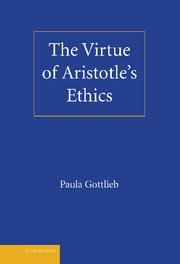Book contents
- Frontmatter
- Contents
- Preface and Acknowledgments
- Abbreviations
- Introduction
- PART I ETHICAL VIRTUE
- 1 Virtue in the Mean
- 2 Nameless Virtues
- 3 The Non-remedial Nature of the Virtues
- 4 Listing the Virtues
- 5 Uniting the Virtues
- PART II ETHICAL REASONING
- Conclusion
- Appendix: Uniting the “Large-scale” Virtues
- Select Bibliography
- Index
5 - Uniting the Virtues
Published online by Cambridge University Press: 29 September 2009
- Frontmatter
- Contents
- Preface and Acknowledgments
- Abbreviations
- Introduction
- PART I ETHICAL VIRTUE
- 1 Virtue in the Mean
- 2 Nameless Virtues
- 3 The Non-remedial Nature of the Virtues
- 4 Listing the Virtues
- 5 Uniting the Virtues
- PART II ETHICAL REASONING
- Conclusion
- Appendix: Uniting the “Large-scale” Virtues
- Select Bibliography
- Index
Summary
A central and controversial thesis of Aristotle's ethics is that it is impossible to have one ethical virtue fully without having all the rest. Given that Aristotle thinks that there are many different virtues, as we have already seen in previous chapters, the problem is not how there can be many different virtues given the fact that they are united in some way, but why, if the ethical virtues are distinct from one another, it is impossible to have one fully without having all the rest.
Aristotle has already provided one possible answer. As we saw in Chapter 1, the doctrine of the mean is first and foremost a doctrine of equilibrium, not moderation. If we imagine the different ethical virtues as the central points of different spokes on a wheel that is balanced on a central pivot, then just as the wheel will not balance if it is out of kilter in any direction, so one cannot have any one virtue fully – be properly balanced – unless one has all the rest. Only if one's dispositions are in equilibrium will one have the correct emotions and act accordingly on the right occasions. Aristotle's direct argument for his thesis is consistent with this picture, but ultimately relies on a deeper insight about the connection between ethical virtue and thought, captured by a new distinction introduced by Aristotle himself, which will be revisited in later chapters.
Aristotle introduces his thesis and his new distinction in the context of Socrates' view (EN VI [EE V] 13 1144b32–1145a2).
- Type
- Chapter
- Information
- The Virtue of Aristotle's Ethics , pp. 92 - 112Publisher: Cambridge University PressPrint publication year: 2009



